- Home
- Anne O'Brien
The King’s Concubine: A Novel of Alice Perrers Page 2
The King’s Concubine: A Novel of Alice Perrers Read online
Page 2
“Why can you not remember the simplest of texts, Alice? Your mind is as empty as a beggar’s purse.” No, not empty, but engaged with something of more moment. Perhaps the soft fur of the Abbey cat as it curled against my feet in a patch of sunlight.
“Alice, you must walk with more elegance. Why do you persist in this ungodly slouch?” My growing limbs were ignorant of elegance.
“A vocation is given to us by God as a blessing,” Mother Sybil, our Abbess, admonished the sinners in her care from her seat of authority every morning in the Chapter House. “A vocation is a blessing that allows us to worship God through prayer, and through good works to the poor in our midst. We must honor our vocation and submit to the Rules of Saint Benedict, our most revered founder.”
Mother Abbess was quick with a scourge against those who did not submit. I remember its bite well. And that of her tongue. I felt the lash of both when, determined to be on my knees at Sister Goda’s side before the bell for Compline was silenced, I failed to shut away the Abbey’s red chickens against the predations of the fox. The result next morning for the hens was obvious and bloody. So was the skin on my back, in righteous punishment, Mother Abbess informed me as she wielded the scourge in the name of Saint Benedict. It did not seem to me to be fair that by observing one rule I had broken another. Unwise as I was in my youth, before I had learned the wisdom of concealing my thoughts, I said so. Mother Sybil’s arm rose and fell with even more weight.
I was set to collect up the poor ravaged bodies. Not that the flesh went to waste. The nuns ate chicken with their bread at noon the following day as they listened to the reading of the parable of the Good Samaritan. My plate saw nothing but bread, and that a day old. Why should I benefit from my sins?
A vocation? God most assuredly had not given me a vocation, if that meant to accept, obey, and be grateful for my lot in life. And yet I knew no other life; nor would I. When I reached my fifteenth year, so I was informed by Sister Goda, I would take my vows and, no longer a novice, be clothed as a nun, thus a seamless transition from one form of servitude to another. I would be a nun forever, until God called me to the heavenly comfort of His bosom—or to answer for my sins. Beginning in my fifteenth year I would not be permitted to speak, except for an hour after the noon meal, when I would be allowed to converse on serious matters. It seemed to me little better than perpetual silence.
Silent for the rest of my life, except for the singing of the offices.
Holy Mother save me! Was this all I could hope for? It was not my choice to take the veil. How could I bear it? It was beyond my understanding that any woman would choose this life enclosed behind walls, the windows shuttered, the doors locked. Why would any woman choose this degree of imprisonment rather than taste the freedom of life outside?
To my mind there was only one door that might open and offer me an escape.
“Who is my father?” I asked Sister Goda. If I had a father, surely he would not be deaf to my entreaties.
“God is your Father.” Sister Goda’s flat response discouraged me from pursuing the matter as she turned the page of a psalter. “Now if you will pay attention, my child, we have here a passage to study.…”
“But who is my father here—out there!” I gestured toward the window that allowed the noise of the town to encroach, its inhabitants gathering vociferously for market.
The novice mistress looked at me, faintly puzzled. “I don’t know, Alice, and that’s the truth.” She clicked her tongue against her teeth as she always did when short of an explanation. “They said that when you were brought here, there was a purse of gold coins.” She shook her head, her veil hanging as limp as a shroud around her seamed face. “But it’s not important. Now if we can…” She shuffled across the room to search in the depths of a coffer for some dusty manuscript.
But it was important! A purse of gold? Suddenly it was very important. I knew nothing other than that I was Alice. Alice—with no family, no dowry. Unlike more fortunate sisters, no one came to visit me at Easter or Christmas. No one brought me gifts. When I took the veil, there would be no one to hold a celebration for me to mark my elevation. Even my habit would be passed down to me from some dead nun who, if fate smiled on me, resembled me in height and girth; if not, my new garment would enclose me in a vast pavilion of cloth, or exhibit my ankles to the world.
Resentment bloomed in me at the enormity of it. Why? The question beat against my mind. Who is my father? What have I done to deserve to be so thoroughly abandoned? It hurt my heart.
“Who brought me here, Sister Goda?” I persisted.
“I don’t recall. How would I?” She was brusque. “You were left in the Abbey porch, I believe. Sister Agnes brought you in—but she’s been dead these last five years. As far as I know, there is no trace of your parentage. At that time it was not uncommon for unwanted infants to be abandoned at a church door, what with the plague.…Although it was always said that…”
“What was said?”
Sister Goda looked down at the old parchment. “Sister Agnes always said it was not what it seemed.…”
“What wasn’t?”
Sister Goda clapped her hands sharply, her gaze once more narrowing on my face. “Mother Abbess said that Sister Agnes was mistaken. She was very old and not always clear in her head. Mother Abbess says you’re most likely the child of some laborer—a maker of tiles—got on a whore of a tavern slut without the blessing of marriage. Now—enough of this! Set your mind on higher things. Let us repeat the paternoster in the very best Latin. No slurring of your consonants.”
So I was a bastard.
As I duly mouthed the words of the paternoster, my mind remained fixed on my parentage or lack of it, and what Sister Agnes might or might not have said about it. I was just one of many unwanted infants and should be grateful that I had not been left to die. But it did not quite ring true, did it? If I was the child of a tavern whore, my parents from the lowest of the common stock, why had I been taken in and given any teaching? Why was I not set to work as one of the conversa, the lay sisters, employed to undertake the heavy toil on the Abbey’s lands or in the kitchens and bake house? True, I was clothed in the most worn garments passed down from the sick and the dead. I was treated with no care or affection; yet I was taught to read and even to write, however poorly I attended to the lessons.
It was meant that I would become a nun. Not a lay sister.
“Sister Goda…” I tried again.
“I have nothing to tell you,” she snapped. “There is nothing to tell! You will learn this Latin text!” Sister Goda, crippled with painful limbs, used her cane across my knuckles but without any real force. Perhaps she had already decided I was a lost cause. “You will stay here until you do! Why do you resist? What else is there for you? Thank God on your knees every day that you are not forced to find your bread in the gutters of London. And by what means I can only guess!” There was no disguising the revulsion that filled her spare frame as she considered the lot of such women. Her voice fell to a harsh whisper. “Do you want to be a whore? A fallen woman?”
I lifted a shoulder in what was undoubtedly vulgar insolence. “I am not made to be a nun,” I stated with misguided courage.
“What choice do you have? Where would you go? Who would take you in?”
I had no answer. But as Sister Goda’s cane thwacked like a thunderclap on the wooden desk, indignation burned hot in my mind, firing the only thought that remained to me: If you do not help yourself, Alice, for certain no one else will.
Even then I had a sharp precocity. Product, no doubt, of a wily laborer who tumbled a sluttish tavern whore after a surfeit of sour ale.
An Event. An Occasion. A disturbance to ruffle the surface of our rigid, rule-bound days. A visitor—a high-blooded lady—came to stay at the Abbey. This was not out of the way, of course. We had frequent visitors to stay for one night or more, ladies of means who came to ease their souls through prayer, or to restore their peace of mind, retiring for
a little while from the world. Or a flighty woman placed with us, so it was said, by a husband who was departing overseas and might not trust his wife to live discreetly, and alone, in his absence. Their sojourn with us was usually brief, making little impact on the ordering of our days other than to give us another mouth to feed and another bundle of laundry to wash.
Ah, but this visitor was different. We knew it the moment that her entourage—there could be no other word for it—rattled in fine style into the courtyard of Mother Abbess’s private accommodations. She was also expected. Was not the whole company of sisters marshaled to welcome her, Mother Abbess to the fore? And what a spectacle. A magnificent traveling litter swayed to a halt, marvelous with swags and gilded leather curtains and the softest of soft cushions, the whole pulled by a team of six gleaming horses. Minions and outriders filled the space. And so much luggage in an accompanying wagon to be unloaded. I had never seen such wealth in one place. A heraldic device stamped the curtains of the litter, but I did not then have the knowledge to recognize it. A frisson of excitement moved through our ranks, of overt curiosity, causing the edges of veils to flutter as if in a breeze. Eyes were no longer demurely downcast.
Jeweled fingers emerged; the curtains were twitched back in a grand gesture.
Well! Blessed Virgin!
The sight stopped my breath as a lady, aided by her tire-woman, stepped from her palanquin. There she stood, shaking out her silk damask skirts—a hint of deep patterned blue, of silver thread and luxuriant fur—and smoothing the folds of her mantle, the jewels on her fingers afire with a rainbow of light. She was not a young woman, but nor was she old, and she was breathtakingly beautiful. I could see nothing of her figure, shrouded as she was in the heavy cloak despite the warmth of the summer day, nor of her hair that was hidden beneath a crispinette and black veil, but I could see her face. It was a perfect oval of fair skin and striking features, and she was lovely. Her eyes, framed by the fine linen and undulating silk, were large and lustrous, the color of new beech leaves.
“My lady.” Mother Abbess glided forward, smooth as a skater over ice. “We are honored.”
We curtsied, a rustle of starched linen and woolen cloth, like a flock of dusty-feathered rooks. The lady nodded sharply, looking around her, and at us, without expression. Since her lips were pressed together into a line as thin as the ale we drank, I did not think she was pleased to be here. Her eyes might glow, but like the stars they held no warmth.
Mother Abbess folded her hands at her waist. “Will your stay with us be of long duration?”
“It is undecided.” The lady’s reply was short but uttered in the most melodious of voices. “I trust you have more than a cell to offer me in this place?”
Which proved my suspicions. She was not a willing guest. I watched in appreciation as the lady withdrew her attention from Mother Abbess—whose nose thinned and bosom swelled—and gave it all to the unpacking of her property. From one of the wagons bounded a trio of little dogs that yapped and capered around her skirts. A hawk on a traveling perch eyed us balefully. And an animal such as I had never seen, all bright eyes and poking fingers, the color of a horse chestnut, with a ruff around its face and a long tail, bounded from the litter. Complete with a gold collar and chain, it leapt and clung to the bodice of the lady’s servant, who submitted with resignation.
I could not look away. I was transfixed, entirely seduced by worldly glory, whilst the creature both charmed and repelled me in equal measure.
“I have rooms for you in my own accommodations,” Mother Abbess was explaining as the dogs sniffed around her skirts. “Anything we can do to make your stay one of solace and comfort at this sad time, my lady…”
Was she then a widow, with her dark veil and cloak? Had she perhaps come to us to spend some quiet time in prayer and contemplation to honor her dead husband? But here being unpacked were a lute and coffers that could only contain clothes. The lady clicked her fingers to hurry her servants along. She did not show evidence of mourning other than her outer garments; nor did she seem aware of the honor of being given rooms within the Abbess’s private lodging, out of bounds to all nuns except for Sister Matilda, Mother Abbess’s Chaplain. Who was this woman who traveled with such authority and self-consequence? Who had dared to show Mother Abbess so little respect?
Mother Abbess’s face continued to preserve a formidably glittering smile. “I will send refreshment to you, my lady.”
“Immediately, if you will.”
“We eat dinner at midday.…”
“I will eat in the privacy of my rooms.”
“Of course, my lady. And if you require anything…”
“Yes. I need a maidservant, a woman to undertake basic tasks for me. I need someone young and capable.” She fixed Mother Abbess with a stare that brooked no dissent.
“Indeed, my lady. I will send one of our conversa to you.…”
Without warning the exotic creature, held inexpertly by the tire-woman, squirmed and bit and escaped to dart through the nuns with harsh cries, snatching at skirts. The nuns flinched as one, their cries in counterpoint. The lapdogs barked and gave chase. And as the animal scurried past me, I knew!
Do it!
An opportunity. A twist of fate.
Do it!
Stooping smartly as the tormented creature skittered past, I snatched at the trailing end of its chain so that the animal came to a screaming, chattering halt at my feet, its sharp teeth very visible. I gave them no thought. Before it could struggle for release, I had lifted it into my arms. Light, fragile boned, its fur incredibly soft, it curled its fingers into my veil and held on.
I felt my face flush as a taut silence fell and all eyes turned on me. Should I have regretted my boldness? I did not. Not even when I discovered that the lady was perusing me as if I were a fat carp in the market. I tried a curtsy, unfortunately graceless, my arms full of shrieking fury.
“Well!” the lady remarked, her lips at last curved into the semblance of a smile, although her eyes remained sharply cool. “How enterprising of you.” And the smile widened into one of blinding charm, sparkling like ice on a puddle on a winter’s morn. “This girl…She’ll do.”
“My lady…!” remonstrated Mother Abbess, frowning at me. “One of our conversa would be far more…”
“I think not.” And, raising her hand in an imperious gesture as if the matter were decided, she said, “Come with me, girl. Keep hold of the Barbary.…”
And so I followed her, my mouth dry, belly churning with a strange mix of shock and excitement. I was to become a maidservant. To fetch and carry and perform menial tasks for a woman who had chosen me. For only a short time, it was true, but I had recognized a chance to be noticed. To be different. And I had seized it by the scruff of its gilded neck. But not for long. As soon as I had stepped into the rooms set aside for our guest, the creature squirmed from my hold and scampered up the embroidered hangings of the great bed, to worry at the damask with sharp teeth. I remained where I was, ignorant of my tasks for this ostentatious person who began to divest herself of her cloak and veil.
“Take these!” she ordered.
Holding out a pair of embroidered gauntlets, she dropped them to the floor, anticipating that I would retrieve them. Her veil and wimple followed in similar fashion, carelessly discarded with no thought for the expensive cloth. I scurried to obey. Thus I had my first lesson as a lady’s waiting woman.
I could not take my eyes from her.
At close quarters, her beauty was even more remarkable. Without the veil, her hair, neatly plaited and pinned over her ears, glowed a soft red-gold in the dim room, the same rich color of the pelt of the fox cub I had seen cast on the midden in the town. As for her skin, pale and translucent, it had a pearl-like hue, soft as the pearls on Mother Abbess’s rosary. Her features could not have been more perfect if she had been a revered statue of Our Lady. I simply stood in silence and admired. Ungainly, inept, unattractive as I knew myself to be, I was in awe o
f this beauty.
The lady let the cloak fall into my arms, and I stood holding the weight of sumptuous cloth, not knowing what else to do. She gave me no direction, and the sheer arrogance of her demeanor forbade me to ask.
“God’s Bones!” she remarked with casual blasphemy that impressed me. “Do I have to tolerate these drab accommodations? I wager it’s worse than a dungeon in the Tower.” She pointed to me to place the cloak on the bed. “It’s mean enough to make me repent!” Picking up a jewel casket, she opened it and trilled a laugh that was not entirely pleasant. “I suppose to you, girl, this is beyond luxury. I suppose you have never slept in a bed such as this—nor ever will.…”
“Yes, madam. No, madam. If it pleases you—how should I address you?”
The lady crowed and addressed her tire-woman, who smirked knowingly.
“She does not know who I am! But then, why should a novice in this backwater of a nunnery know me? But by God! She will within a twelvemonth; I swear it! The whole country will know of me!” The viciousness of the tone was incongruous, stridently at odds with her beauty. “You will call me ‘my lady,’” she said as she tossed the box onto the bed and approached me to finger my veil with obvious distaste, pulling its folds into some sort of order. “I am Joan, Countess of Kent. For now, at least. Soon I will be wife to Prince Edward. The future King of England.”
I knew nothing of her. What I did know was that I had been chosen. She had chosen me to serve her. I think pride touched my heart.
Mistakenly, as it turned out.
I became a willing slave to Countess Joan. The Fair Maid of Kent whose grace and beauty were, she informed me, a matter for renown throughout the land. When she needed me, she rang a little silver bell that had a remarkable carrying quality. It rang with great frequency. The Countess’s tire-woman, Lady Marian, a distant and impecunious cousin of Fair Joan, seemed to find every excuse to be absent when the need arose.

 The Queen's Rival
The Queen's Rival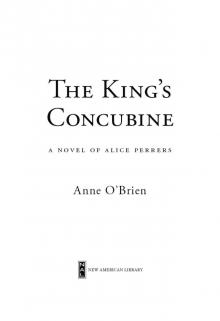 The King’s Concubine: A Novel of Alice Perrers
The King’s Concubine: A Novel of Alice Perrers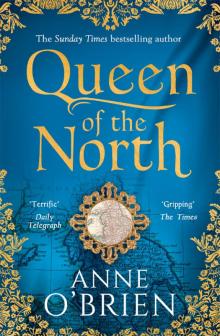 Queen of the North
Queen of the North The Scandalous Duchess
The Scandalous Duchess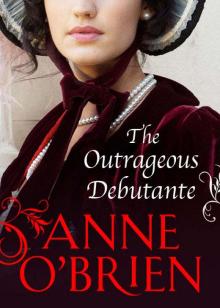 The Outrageous Debutante
The Outrageous Debutante The Forbidden Queen
The Forbidden Queen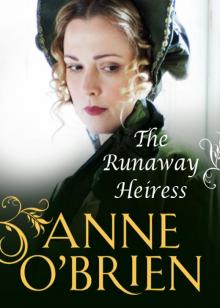 The Runaway Heiress
The Runaway Heiress Devil's Consort
Devil's Consort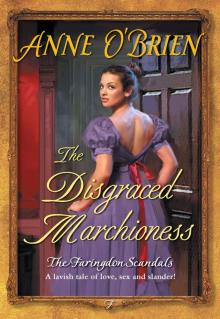 The Disgraced Marchioness
The Disgraced Marchioness Chosen for the Marriage Bed
Chosen for the Marriage Bed Puritan Bride
Puritan Bride Battle-Torn Bride
Battle-Torn Bride Conquering Knight,Captive Lady
Conquering Knight,Captive Lady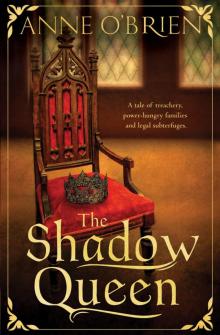 The Shadow Queen
The Shadow Queen Virgin Widow
Virgin Widow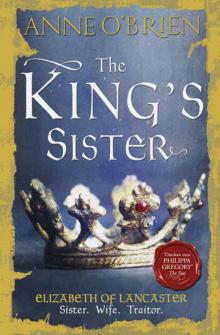 The King’s Sister
The King’s Sister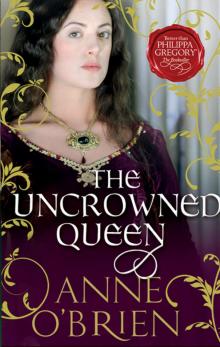 The Uncrowned Queen
The Uncrowned Queen The Queen's Choice
The Queen's Choice